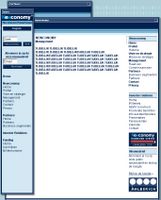Instalment 21: Newconomy

Maurice de Hond is a market researcher by profession and famous for his political polls; het turned an Internet guru, wrote about Internet and was director ICT and Internet at the publishing company Wegener, before he started Newconomy
In 1999 Maurice de Hond wrote in the annual report of Newconomy the famous last words: “Having completed the millennium, we stand at the beginning of a new economy. The laws of classical economy no longer hold ground. What is worldwide indicated as New Economy, has made its entry irrevocably.” This statement was the beginning of the rise but also the fall.
The new economy had manifested itself amongst others with a slew of free ISP services. The incumbent telco KPN had launched Het Net; Freeler launched free net plus e-mail with the help of the Postbank, while more exotic services like Raketnet, Knok-knok and Wish (Worldwide Internet Services Holland) popped up like mushrooms and had success. Wish went online on January 25, 1999 and had a base of 150.000 users in less than five months. The businessmodel of the service was based on a one time administration fee of 10 euro, income from advertisements, webhosting services and development of web sites for companies. In 2000 Wish was acquired by Newconomy for 18 million Dutch guilders (8 million euro). Wish users were valued at 153,61 euro each.

Logo of Newconomy
Newconomy had grown out of the economic network ICOM (Internet Competence Network NV) and changed its name into Newconomy. It supported and stimulated ICT- and Internet companies in their growth with venture capital, management support and an active network formula. The company was active in e-commerce, content, B2B services and new technologies. Besides investing in companies it also ran the training institute Newacademy.
In 1999 the company had gathered 11,1 million euro of which 8,2 million had been invested in 17 companies. Based on the valuation of these companies Newconomy had a positive balance of 1,3 million euro in that year. Following the example of many start-up Internet companies Newconomy wanted an IPO. One month after the disastrous stock exchange notation of Worldonline on April 20, 2000 Newconomy picked up 74,9 million euro. With that money Newconomy invested in 14 new companies. But due to another accounting method, a netto loss of 69,4 million euro was registered. It did not take long before a crises boiled up. Maurice de Hond was sent home, two member of the board left and an interim manager was installed. This led to the unavoidable clean-up. Shares in the Dutch search engine Ilse were sold to VNU. The participation portfolio was cleaned –out for no less than 19,2 million euro. And 7 participations participaties (ALS, BitMagic, BuyOnline, Pango, Macropolis, Pharmaplaza en Yooz.com) went bankrupt. After this clean-up Maurice de Hond came back seconded by a new board. But on August 16, 2001 a very disappointed De Hond took again leave, but this time it was definite.

An original webpage of Newconomy identifying the management; the messagege reads: AD INTERIM AD INTERIM etc. (compliments of Planet Multimedia)
Again interim managers were ushered in and in 2202 W.J. van Dijssel and a group of private investors took over Newconomy. One of there first actions was to change the name in Real Time Company. Newconomy had gone full circle from the old economy to the new one and back to real time.
The problems of Worldonline and Newconomy should be seen in the context of time. The TMT sector (Technology, Media, Telecom) was the conduit of the new economy. Investing in other sectors was old-fashioned, while TMT funds went up and up, until the end of 2000, when the internet hype was over. Of the 31 companies under the aegis of Newconomy only a few survived on their own strength: TIE Holding, DigiNotar and Infostrada.
(Part of the website of Newconomy has been archived, while Beursgorilla has a overview of events)

No comments:
Post a Comment